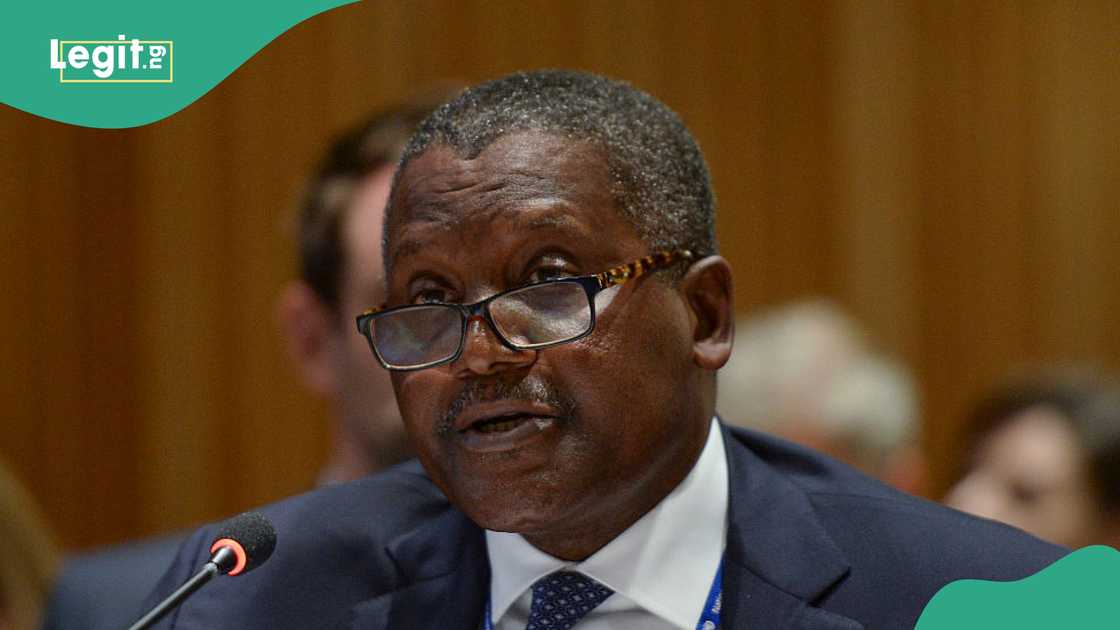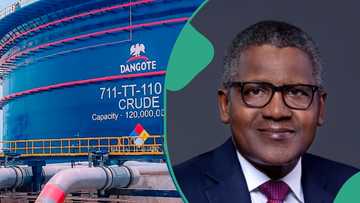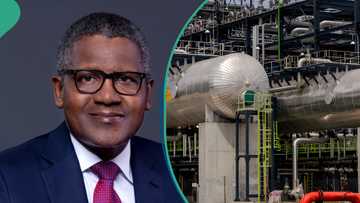Dangote Sets Date to Shut Down Refinery Unit, to Sell Residual Fuel
- Dangote Refinery wants to sell residual fuel oil amid plans to shut its 204,000-barrel-per-day petrol refinery unit
- The unit will undergo 30 days of maintenance starting June 1, as the Dangote refinery targets efficiency
- Dangote Refinery recently stopped selling petrol in Naira, citing a mismatch between sales revenue and crude purchase
Legit.ng journalist Dave Ibemere has over a decade of business journalism experience with in-depth knowledge of the Nigerian economy, stocks, and general market trends.
Dangote Petroleum Refinery has launched a tender to sell 128,000 metric tons of residual fuel oil, according to a document summary released on Tuesday.
The tender, set to close on Wednesday, March 26, by 1 pm Nigerian time, aims to secure buyers for 88,000 tons of low-sulphur straight-run fuel oil and 40,000 tons of slurry oil for loading between April 10-12

Source: Getty Images
Dangote Refinery to undergo maintenance
Dangote Refinery, which has a capacity of 650,000 barrels per day, plans to shut down its 204,000-barrel-per-day petrol production unit for maintenance starting June 1, as confirmed by industry monitor firm IIR.
This maintenance period is expected to last for 30 days, Reuters reports.
Meanwhile, data from shipping analytics firm Kpler indicates that Dangote's fuel oil exports averaged 75,000 barrels per day from March to August 2024, but declined to 20,000 barrels per day from September onwards due to the commencement of its petrol-making residue fluidised catalytic cracking unit.
Dangote exports petroluem product
BusinessPost reports that in efforts to meet its operational targets, Dangote Refinery has been procuring feedstock globally, including from the US, Angola, and Algeria, alongside bolstering domestic deliveries.
Edwin Devakumar, vice-president of Dangote Industries Limited (DIL), previously stated in February that the refinery could achieve full operational capacity within 30 days.
The refinery received over 24 million barrels of Nigerian crude oil between October and November last year.
Aliko Dangote, chairman of Dangote Industries, reassured the public of the refinery's capability to meet Nigeria's fuel demand with over N600 billion worth of premium motor spirit (PMS) in storage.
On the domestic front, there has been a setback following the decision by the Nigerian National Petroleum Company (NNPC) Limited to suspend the naira-for-crude deal.
In response, Dangote Refinery decided to stop the sale of petrol to the Nigerian market in naira.
The refinery cited financial mismatches between the cost of buying Dollar-denominated crude oil purchase obligations and the selling price in naira.
Dangote Refinery now an economic powerhouse
Aliko Dangote’s $19 billion refinery was meant to be Nigeria’s game-changer in the petroleum sector, but its journey to launch was far from smooth.
The Nigerian National Petroleum Company (NNPC) initially hesitated to supply crude, prioritizing its own refineries despite their inefficiencies.
Negotiations dragged on, with the NNPC insisting on pricing and supply terms that delayed operations.
The Nigerian Midstream and Downstream Petroleum Regulatory Authority (NMDPRA) also posed hurdles.
Regulatory bottlenecks, licensing delays, and compliance issues slowed progress. At a point, Farouk Ahmed, NMDPRA boss, claimed that local refineries, including the Dangote Refinery, produce inferior products compared to imported ones.
Fuel marketers, on the other hand, worried the refinery’s dominance could disrupt existing distribution networks, adding another layer of contention.
Despite these setbacks, the refinery finally commenced operations, and its impact has been profound. Nigeria, once heavily dependent on imported fuel, now sees reduced forex spending on refined products.
Fuel scarcity has eased, and local industries benefit from a steady petroleum supply. The refinery also creates thousands of jobs, boosting economic activity across multiple sectors.
Now, with the refinery refining over 300,000 barrels per day, Nigeria moves closer to energy self-sufficiency.
The once-contentious project now stands as a beacon of industrial success, proving that overcoming bureaucratic and structural hurdles can unlock immense national growth.

Read also
Dangote Refinery supplies jet fuel to US as Nigerians await return to petrol sales in naira
New petrol prices emerge in Nigeria
In a previous report by Legit.ng revealed that marketers were expected to increase fuel prices, with costs projected to reach nearly N900 per litre.
This is because Dangote Refinery's decision to halt the sale of petroleum products in naira exposed the Nigerian market to shifting global prices.
Major depots such as Matrix Warri, Zamson, Rainoil, Pinnacle Warri, and Sobaz have already adjusted their ex-depot prices when selling to marketers from N825 to almost N860 per litre.
The article has been updated with additional comments by head of business desk Victor Enengedi.
PAY ATTENTION: Сheck out news that is picked exactly for YOU ➡️ find the “Recommended for you” block on the home page and enjoy!
Proofreading by Kola Muhammed, copy editor at Legit.ng.
Source: Legit.ng

Dave Ibemere (Senior Business Editor) Dave Ibemere is a senior business editor at Legit.ng. He is a financial journalist with over a decade of experience in print and online media. He also holds a Master's degree from the University of Lagos. He is a member of the African Academy for Open-Source Investigation (AAOSI), the Nigerian Institute of Public Relations and other media think tank groups. He previously worked with The Guardian, BusinessDay, and headed the business desk at Ripples Nigeria. Email: dave.ibemere@corp.legit.ng.

Kola Muhammed (Copyeditor) Kola Muhammed is an experienced editor and content strategist who has overseen content and public relations strategies for some of the biggest (media) brands in Sub-Saharan Africa. He has over 10 years of experience in writing and (copy)editing.




